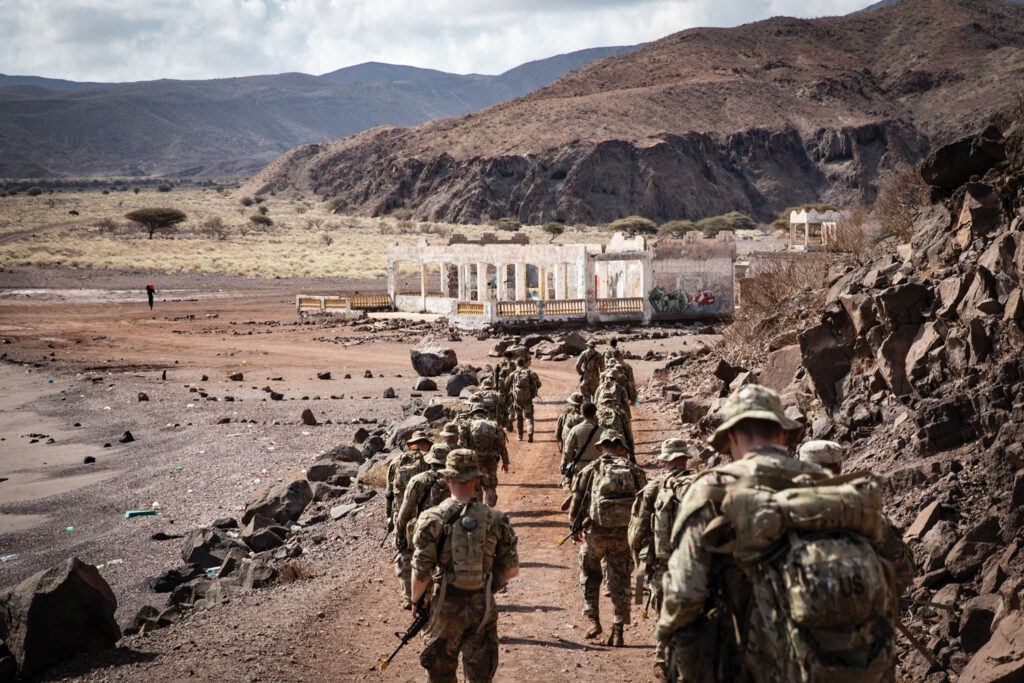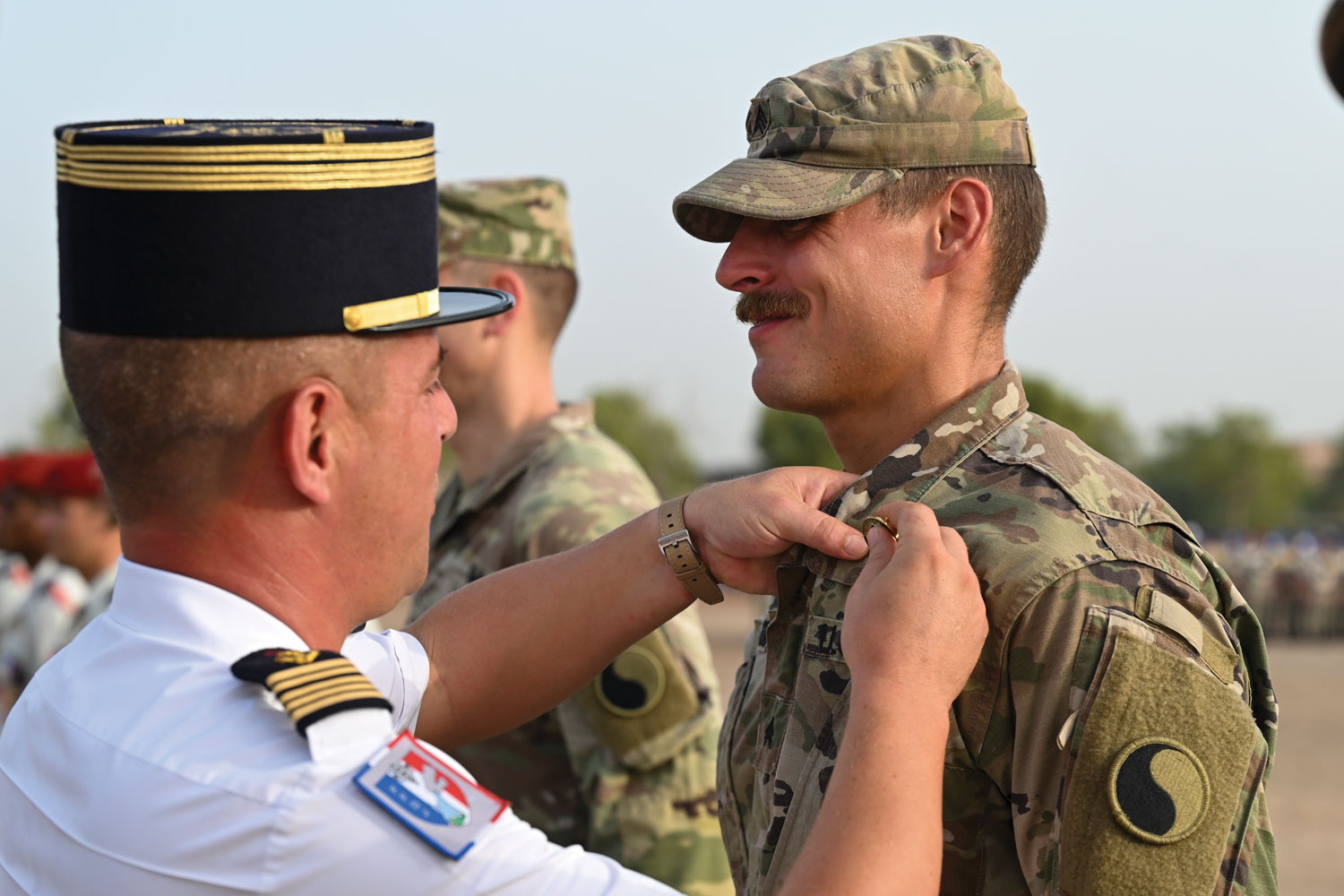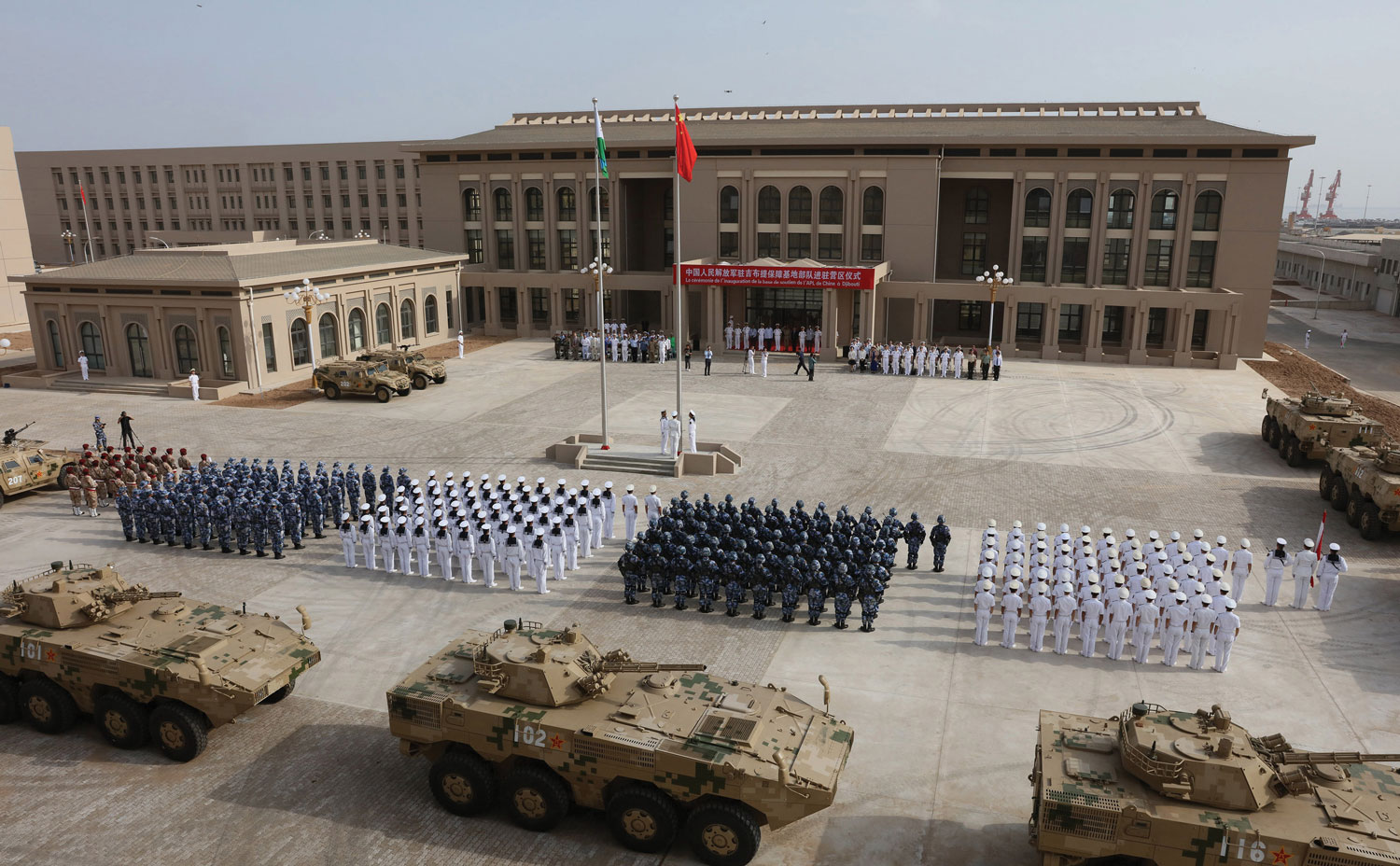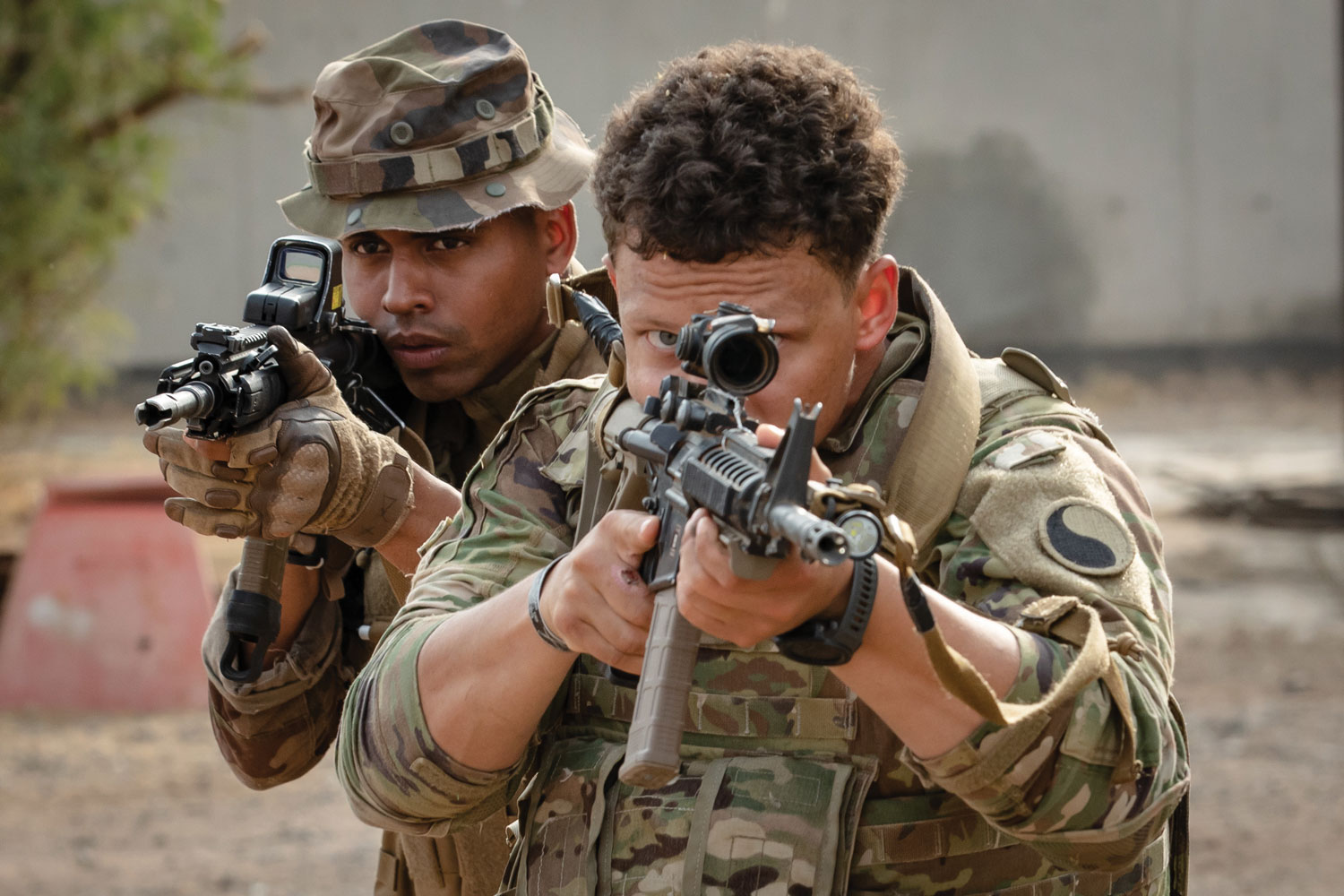Boots on Strategic Ground
An Army Guard task force is helping secure a volatile region on the shores of a critical maritime shipping chokepoint, and the Chinese are there, too
- By Bob Haskell
Staff Sgt. Jeff Clements
Tell us if you’ve heard this one before. “We didn’t really know what to expect and what we were going to walk into.”
Sound familiar? Like something that National Guard soldiers and airmen, and a multitude of other military people, have said a few million times before?
The speaker was Kentucky Army National Guard 1st Sgt. Richard Harris, the top enlisted soldier with B Company, 1st Battalion, 149th Infantry Regiment.
It was early July, and Harris was commenting from the tiny Republic of Djibouti on the so-called Horn of Africa, seven time zones, an ocean and a continent away from Somerset, Kentucky, where his outfit calls home.
It was “Africa hot,” as the movie line goes; about 110 degrees at Camp Lemonnier, once a French Foreign Legion garrison, where Harris and other leaders of Task Force Red Dragon were speaking by telephone to National Guard.
The summer’s African heat was but one of the challenges and opportunities the Guard soldiers from Virginia, Kentucky and Tennessee had walked into and embraced in what has been called “one of the most volatile regions on the continent.”
Working with troops from France, Italy, Japan and Spain; coexisting with China’s only foreign military base; coping with militant extremists in Somalia; and being dispersed over an area roughly half the size of the continental have been some of the others.
The task force of some 1,000 Army Guard soldiers, primarily from Virginia and the 116th Infantry Brigade Combat Team, has been the security element for the Combined Joint Task Force-Horn of Africa since Jan. 8.
AT A GLANCE
Djibouti
- Area: 8,950 square miles
(slightly larger than New Hampshire) - Population: 942,000 (smallest in mainland Africa)
- Climate: Desert; torrid, dry
- Capital: City of Djibouti
- Government: Presidential republic
- Languages: French, Arabic, Somali, Afar
- Predominant Religion: Islam
- Life expectancy: 61 years (men), 64 years (women)
- Currency: Djiboutian franc
- Real GDP per capita: $5,000
Source: CIA Fact Book
Why the National Guard? Why not? To paraphrase an old saying: The Red Dragons ain’t ridin’ in the Guard’s first rodeo in Africa.
There was a time, between 35 and 40 years ago during the Cold War, when Germany was the international adventure for thousands of National Guard members who deployed for two or three-week annual REFORGERS — Return of Forces to Germany — which most Guard troops now know little or nothing about.
Much has changed during the past three decades because of the Persian Gulf War, peacekeeping missions in the Baltics, deployments to Afghanistan and Iraq and the State Partnership Program. The Guard has become expeditionary, one could argue, and Africa is now an international benchmark.
Troops from Massachusetts to California have been frequent visitors to countries across Africa’s vast reaches for most of this century. Beginning in 2003, 14 states and the District of Columbia have formed alliances with 17 nations — from Morocco in the north to South Africa — through SPP.
North Dakota has three western African partnerships — with Benin, Ghana and Togo. All of the partnerships have been formed since the 9/11 terrorist attacks. That, however, seems to be the SPP trend: Sixty-two of the 87 SPP alliances have been formed during this century, primarily within the U.S. Africa and Indo-Pacific commands.
“A more stable and prosperous Africa will enhance America’s security.”
—Gen. Stephen Townsend
Commander, U.S. Africa Command
July 26, 2019 – Aug. 8, 2022
Most of the Red Dragons are based with other international forces in Djibouti, but they are also deployed to Kenya and Somalia, says Virginia Army Guard Lt. Col. Jim Tierney, who commands the task force as well as the 1st Battalion, 116th Infantry Regiment, the Red Dragons’ core command.
Command and control presents Tierney with what he calls “unique opportunities in terms of just the distance of separation between us. Essentially, my headquarters would be located somewhere in Michigan and the companies would be in Washington, D.C., and South Carolina and Georgia,” he explains.
But the Red Dragons’ area of interest is considerably bigger. “We provide support to and are prepared to support pretty much most of Sub-Saharan Africa,” Tierney says.
Advanced technology and effective leadership offset the distances. “Good, trusted subordinate leaders, that’s where the money is being made,” he adds. “They understand the guidance, and they’re able to execute.”
Members of the 429th Brigade Support Battalion, the 183rd Cavalry Regiment’s 2nd Squadron, the 116th Infantry’s 3rd Battalion, all from Virginia, and the 268th Military Police Company from Tennessee are also part of the force slated to finish its nine-month African deployment this month.
Security and rapid response are the primary missions, Tierney says. Security duties have been the order of business in Djibouti, Kenya and Somalia. A quick reaction force for the CJTF-HOA commander is also situated in Djibouti. And Guard troops man an East Africa Response Force to support and protect personnel, infrastructure and interests for AFRICOM.
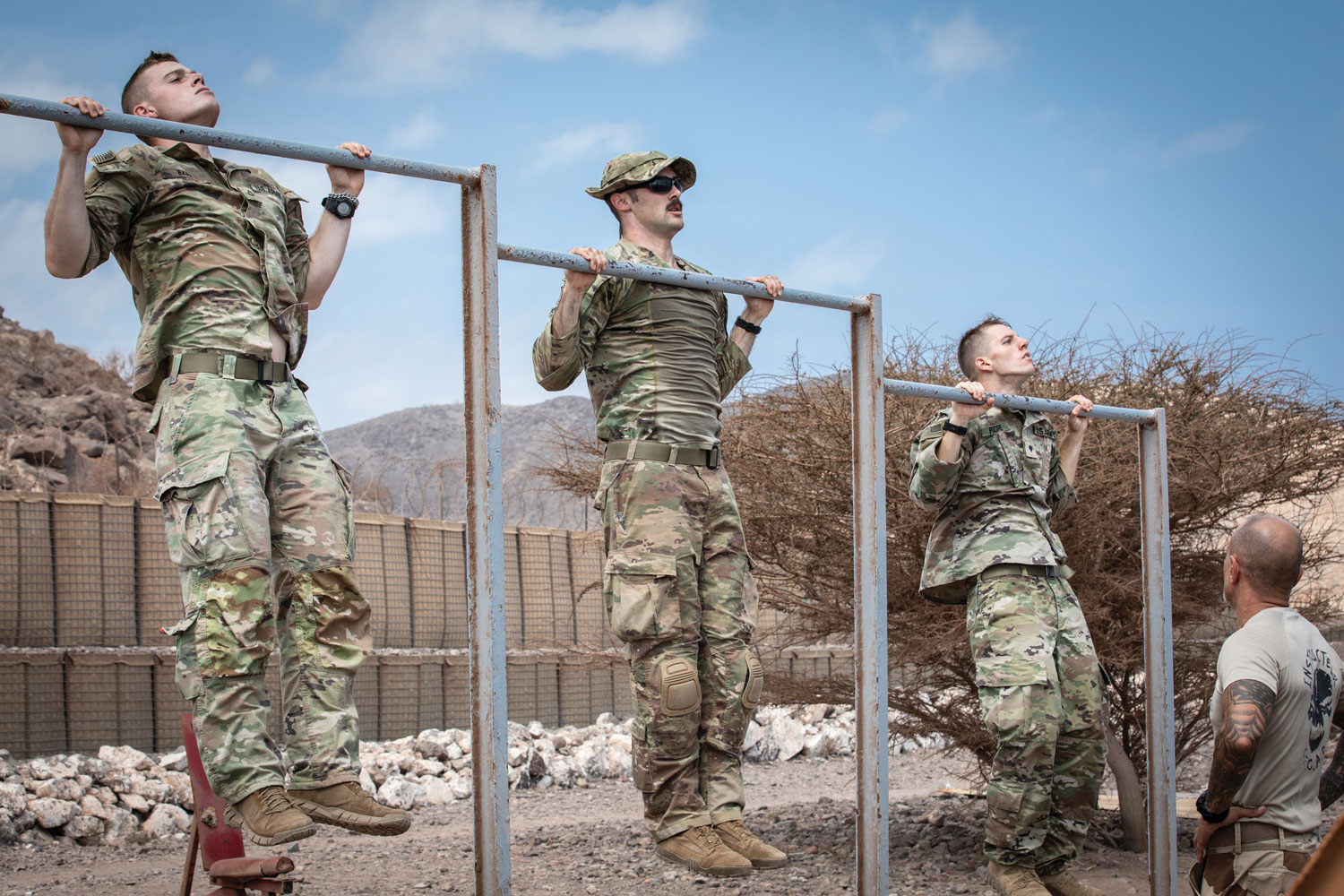
Staff Sgt. Jeff Clements
“We really appreciate the opportunity to fill this mission because of the diversity in the region,” says Tierney, whose 27 years as a Guard officer have been seasoned by deployments to Afghanistan, Jordan. “You’re got great-power competition [in Djibouti]. You’ve got violent extremist organizations [in Somalia]. You’ve got both ends of the spectrum that we’re challenged by, or that we could be.
Operational security prompted Tierney to keep the cards of precisely what his soldiers are doing and where close to the vest — especially details about events in Somalia. The Red Dragons did support Kenyan defense forces who had the lead in counterterrorism operations
“A lot of patrolling, both mounted and dismounted,” he says.
Becoming a trusted friend in the region is paramount.
“Our experiences here are that the host countries that we work with really look to the United States for opportunities to partner and train,” Tierney says. “And our responsibility is to make sure that we’re seen as the best partner that African nations would want to work with. I think that becomes apparent in the bigger picture.”
That’s keeping with what Army Gen. Stephen Townsend, the AFRICOM commander from 2019 until last month, told the Senate Armed Forces Committee on March 15.
“A more stable and prosperous Africa will enhance America’s security,” he said. “AFRICOM is committed to our work to improve security and stability, to doing our part in the whole of U.S. government efforts to lessen the sources of extremist recruitment, to create stable political environments, to improve governance and to promote democracy and the rule of law.”
The Red Dragons’ predecessor, Task Force Iron Gray, certainly contributed to that objective in the eyes of the former CJTF-HOA commander, Virginia Army Guard Maj. Gen. Bill Zana, who presided over the transfer of authority in January.
“Our relationships with our Djiboutian, French, Japanese, Italian, Spanish and many African nation partners are stronger than ever as a result of Task Force Iron Gray’s focused engagement, effort and teamwork across all of our joint services,” said Zana about that force spearheaded by the Connecticut Guard’s 1st Battalion, 102nd (Mountain) Infantry Regiment.
The Red Dragons have made their own positive impressions.
“They’re an amazing group of security experts!” praises a CJTF-HOA spokesman.
Sgt. Joshua Johnson, a 3rd Battalion, 116th Infantry sniper team leader, talks of visiting Djiboutian young people, ages 5 to 18, at a daycare center near Djibouti City with a dozen soldiers in early June. “The children were full of energy, full of love,” he says. “We handed out candy and some toys. They really enjoyed it.”
This isn’t Johnson’s first deployment to Africa. A former Marine Corps Reservist, he served as sniper team spotter at the U.S. embassy in Tripoli, Libya, in 2013, a year after the Benghazi attacks on the facility a year earlier.
Task members have also helped the local population in unplanned ways.
Some 1st Battalion soldiers came to the aid of three civilian victims of a truck rollover in Kenya, close to Camp Simba around Manda Bay on May 25. The troops, who had been on patrol, pulled one unconscious man from the truck’s cab by kicking out the windshield and stabilized all three until an ambulance arrived, wrote a CJTF-HOA reporter.
“[The village people] were all pretty grateful for us helping and invited us to come back to their village,” said Staff Sgt. Chandler Potts, the squad leader. “It was a good experience to be in the right place at the right time and help out some people in need.”
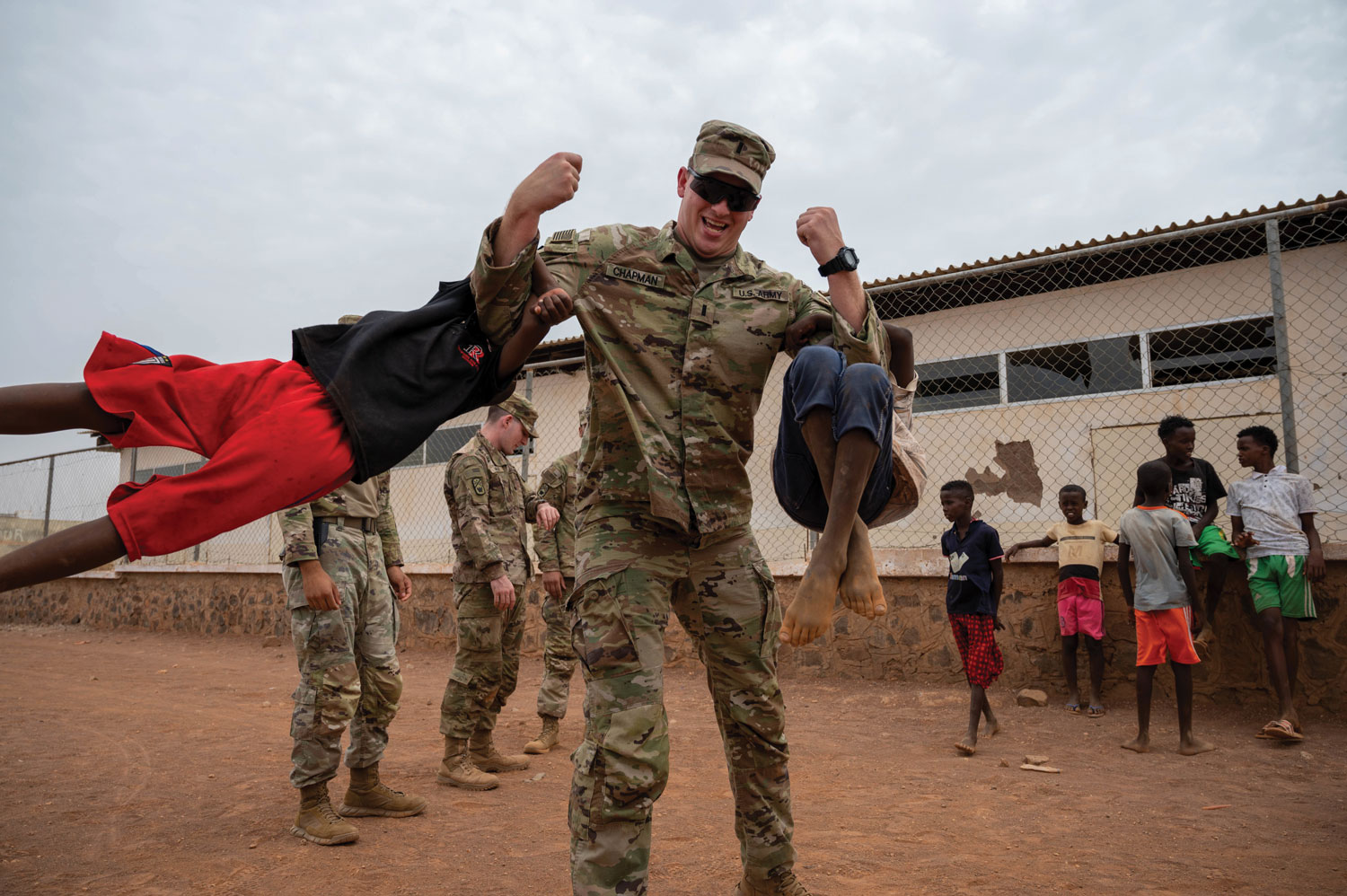
Staff Sgt. Branden Rae
Perhaps we should start with Djibouti to understand why it’s so important for the Red Dragons to be on the Horn of Africa.
The republic’s small size, and population (At a Glance, page 21) is dwarfed by its strategic importance. It’s located at the mouth of the crucial Bab al-Mandab Strait that connects the Red Sea and the Gulf of Aden.
The narrow strait is one of the most important shipping routes in the world, connecting the Indian Ocean with the Suez Canal that feeds into the Mediterranean Sea. An estimated 6.2 million barrels per day of crude oil, condensate and refined petroleum products flowed through the Bab el-Mandeb Strait in 2018, the latest figures available from the U.S. Energy Information Administration.
A former French colony, the country is also vital hub for military forces that safeguard those lanes and the rest of the region. Camp Lemonnier is now a U.S. Navy base and this country’s only permanent installation in Africa. There is the French Naval base of Héron; the Japanese Self-Defense Force Base Djibouti; and an Italian support base, Base Militare Nazionale di Supporto.
There is also the Chinese People’s Liberation Army Support Base, China’s only foreign military installation, established in 2017. China calls a logistical support facility, and Chinese ships have conducted anti-piracy patrols nearby since the late 2000s.
U.S. commanders are concerned about China’s activity at the facility, which is only a few miles from Camp Lemonnier, and about Beijing’s future plans there. The Chinese recently upgraded the base with a pier large enough to accommodate an aircraft carrier.
“They have it there because probably in the future they want to have the ability to be able to affect the free flow of commerce that affects our global economy,” Marine Corps Gen. Michael Langley, who assumed command of AFRICOM last month, said of the base during his Senate confirmation hearing.
Senior Airman Blake Wiles
Why the National Guard? Why not? To paraphrase an old saying: The Red Dragons ain’t ridin’ in the Guard’s first rodeo in Africa.
There was a time, between 35 and 40 years ago during the Cold War, when Germany was the international adventure for thousands of National Guard members who deployed for two or three-week annual REFORGERS — Return of Forces to Germany — which most Guard troops now know little or nothing about.
Much has changed during the past three decades because of the Persian Gulf War, peacekeeping missions in the Baltics, deployments to Afghanistan and Iraq and the State Partnership Program. The Guard has become expeditionary, one could argue, and Africa is now an international benchmark.
Troops from Massachusetts to California have been frequent visitors to countries across Africa’s vast reaches for most of this century. Beginning in 2003, 14 states and the District of Columbia have formed alliances with 17 nations — from Morocco in the north to South Africa — through SPP.
North Dakota has three western African partnerships — with Benin, Ghana and Togo. All of the partnerships have been formed since the 9/11 terrorist attacks. That, however, seems to be the SPP trend: Sixty-two of the 87 SPP alliances have been formed during this century, primarily within the U.S. Africa and Indo-Pacific commands.
A Red Dragon with the Blue & Gray
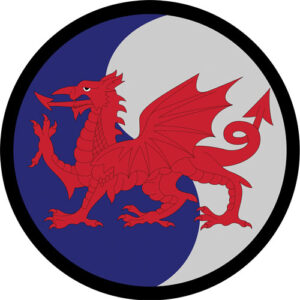 The Red Dragons have a history of going far from home to serve their homeland. It’s just that their name has been changed within the last 78 years, explains Lt. Col. Jim Tierney, task force commander.
The Red Dragons have a history of going far from home to serve their homeland. It’s just that their name has been changed within the last 78 years, explains Lt. Col. Jim Tierney, task force commander.
The 116th Infantry’s 1st Battalion was codenamed “Lemon Red” when those soldiers in the 29th Infantry Division suffered heavy losses while surging ashore at Omaha Beach on D-Day, June 6, 1944.
The name was changed to Red Dragon years later because, Tierney surmised, “Dragon” sounded more military than “Lemon.”
The Red Dragons commemorated all of their regiment’s D-Day heroes this June 6 with a ruck march at Camp Lemonnier. Staff Sgt. Stephanie Ashwell, an intelligence specialist whose great uncle died on Omaha Beach, sounded Taps on the trumpet.
“This moment with the task force and the 116th is extremely meaningful to me,” she remarked.
—By Bob Haskell
Why the National Guard? Why not? To paraphrase an old saying: The Red Dragons ain’t ridin’ in the Guard’s first rodeo in Africa.
There was a time, between 35 and 40 years ago during the Cold War, when Germany was the international adventure for thousands of National Guard members who deployed for two or three-week annual REFORGERS — Return of Forces to Germany — which most Guard troops now know little or nothing about.
Much has changed during the past three decades because of the Persian Gulf War, peacekeeping missions in the Baltics, deployments to Afghanistan and Iraq and the State Partnership Program. The Guard has become expeditionary, one could argue, and Africa is now an international benchmark.
Troops from Massachusetts to California have been frequent visitors to countries across Africa’s vast reaches for most of this century. Beginning in 2003, 14 states and the District of Columbia have formed alliances with 17 nations — from Morocco in the north to South Africa — through SPP.
North Dakota has three western African partnerships — with Benin, Ghana and Togo. All of the partnerships have been formed since the 9/11 terrorist attacks. That, however, seems to be the SPP trend: Sixty-two of the 87 SPP alliances have been formed during this century, primarily within the U.S. Africa and Indo-Pacific commands.
STR/AFP via Getty Images
For example, Kenya is partnered with Massachusetts, Rwanda with Nebraska and Kentucky with Djibouti.
Meanwhile, a lot of citizen-soldiers have been handling Horn of Africa security during the last five years, Red Dragon leaders explain.
Task Force Iron Gray troops from Connecticut, Colorado, Maine, Massachusetts and Vermont within the 86th Infantry Brigade Combat Team held the ground for nine months before the Red Dragons took over.
Previous Guard forces came from Illinois, Iowa, Minnesota, New Jersey, New Mexico. Oregon, New Mexico and Texas, ticked off Wolfe in a room where the plaques are displayed. Next up, is the 1,100-member Task Force Wolfhound, built around the 69th Infantry from New York.
One remarkable thing about these deployments is that they’ve been going on so quietly for so long.
A thousand citizen-soldiers at a time leaving their families and schools and jobs to spend nine months in East Africa does generate hometown media coverage and interest, perhaps concern, among the folks who are left behind, Tierney points out.
But the East African missions are peacekeeping in nature. They are not invasions. There have been no pitched battles, no coffins draped with American flags, no incidents that would sound alarms from coast to coast.
CJTF-HOA personnel have built schools, clinics and hospitals; drilled new wells and improved others; and trained with military troops in partner nations.
“You’re got great-power competition [and] violent extremist organizations [here]. You’ve got both ends of the spectrum.”
—Lt. Col. Jim Tierney
Commander
1st Battalion, 116th Infantry Regiment
Still, no one is discounting the risks inherent in that part of the world.
“We know that there is a threat out there — whether it’s al-Shabaab or while it’s making sure we’re the best partner to the African partners,” Tierney says. “And I think that’s what helps keep our soldiers focused. They understand it, and they take it very seriously.”
They trained accordingly to improve their individual skills and to serve with their allies — especially the French.
In mid-March, two Red Dragon platoons from Virginia and Kentucky took part, with more than 2,000 French troops, in the three-day WAKRI 22, the largest annual French-led exercise in Djibouti for land, sea and air components.
Capt. Keith Waller, the B Company commander, and 1st Sgt. Harris went with the Kentucky platoon. “It was a really awesome experience. We’ll probably never get another opportunity like that in our careers,” marveled Waller.
Other training at Camp Lemonnier included 18.6-mile Norwegian Foot Marches that Waller’s company conducted and in which French, Italian, Japanese and Spanish troops marched.
The French offered a half-month French Desert Commando Course that challenged physical and mental toughness and stressed skills similar to small-unit tactics taught at Army Ranger School. Thirty-five Camp Lemonnier soldiers passed the Ranger Physical Fitness Test to get into the course and 26 graduated, Tierney says.
Although soldiers frequently understand other soldiers, the language barrier did pose some difficulties.
Staff Sgt. Jeff Clements
A case in point involved a U.S. and a French soldier who could not speak one another’s language, Tierney recalls. But one American soldier spoke Russian. So did the Frenchman. So they communicated in Russian.
It was another lesson for the Red Dragons who, leadership is confident, have learned many of them.
“If you’re going to ask soldiers to leave their families, leave their employers, leave their schools for a year to go to a foreign country that they probably couldn’t pinpoint on a map two years ago, it had better be worth their time,” Tierney says.
It has been, say his soldiers.
“We’re building the next generation of leaders for our organization,” Wolfe explains. “With the opportunities that are afforded on this deployment here in Africa, we’re able to train the next level of leaders so that myself and First Sergeant Harris can retire one of these days and know that the soldiers and NCOs and officers who are on the mission have really, really had an opportunity to learn how to operate.”
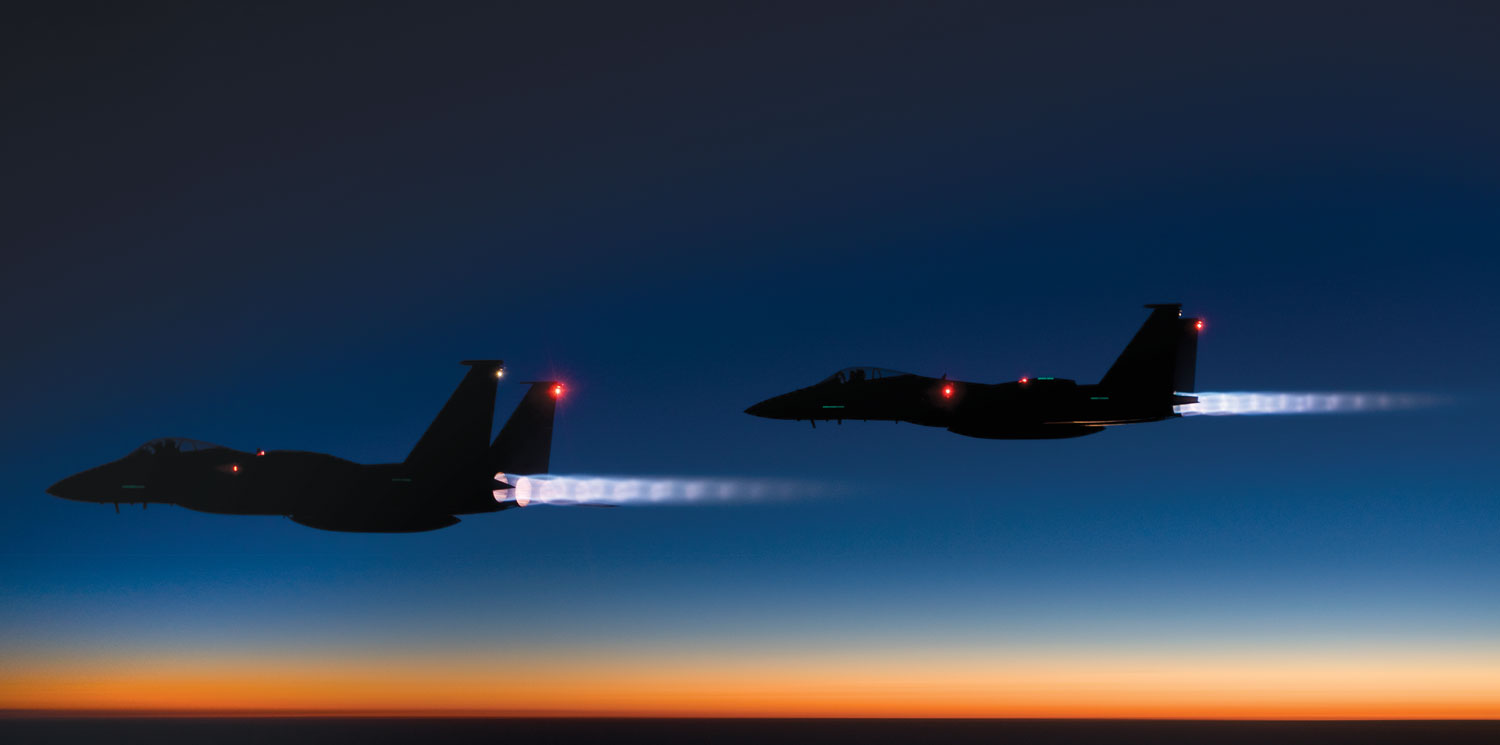
High Speed
Most Air Guard fighter pilots are fulfilling their life’s calling, one that requires rare attributes and a significant commitment
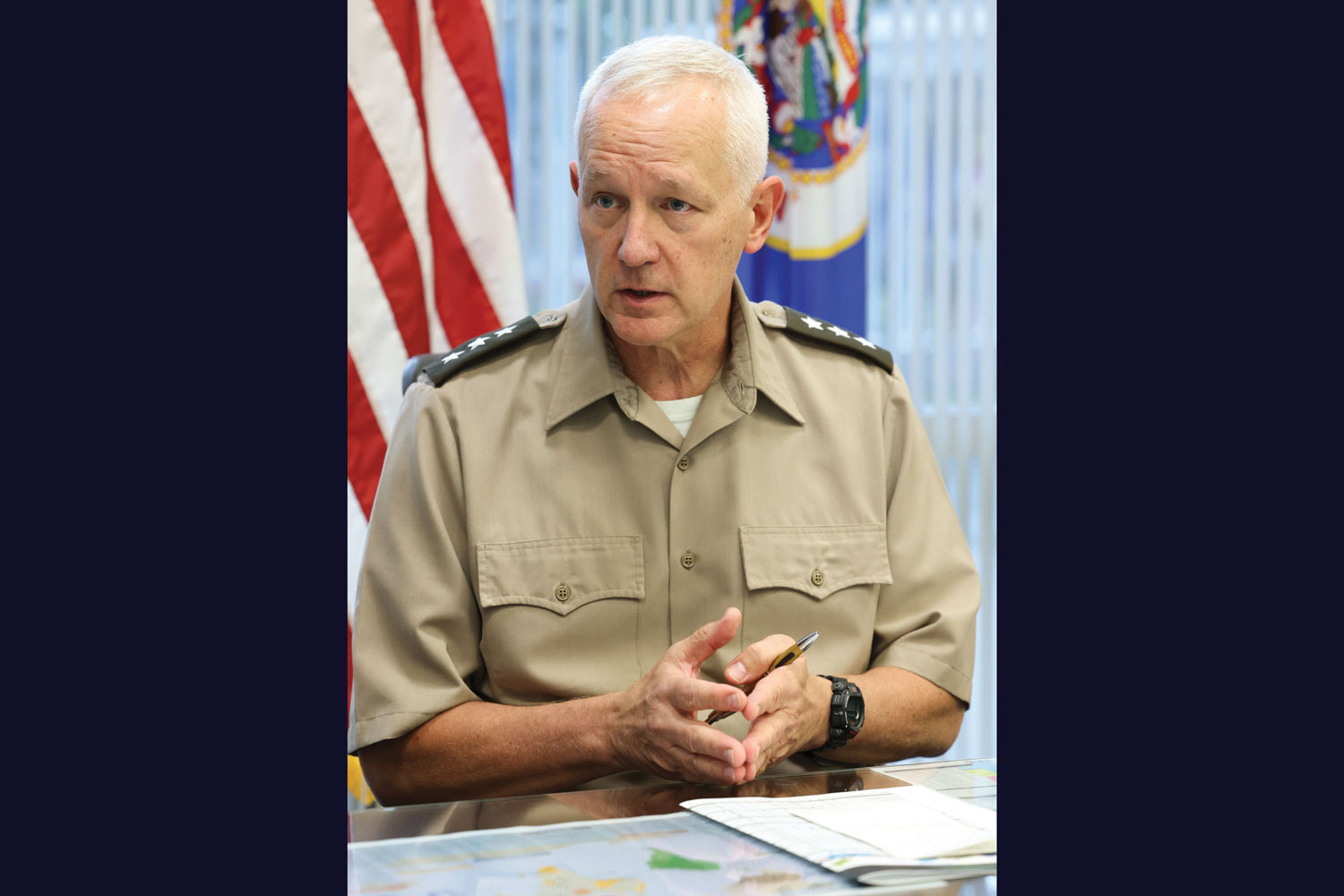
‘End strength is our No. 1 mission’
A Conversation with Lt. Gen. Jon A. Jensen
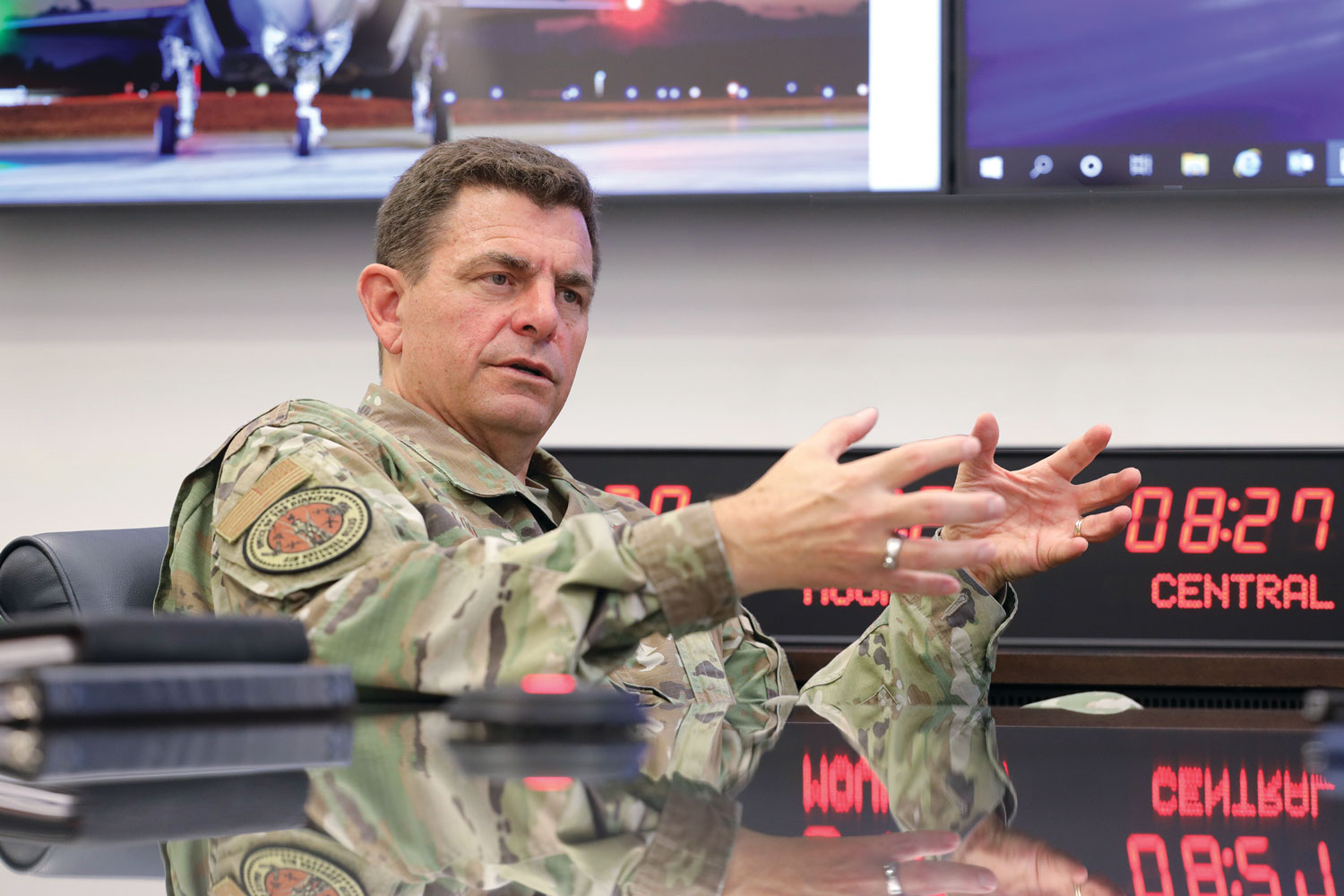
‘The Air Force is truly at an inflection point’
A Conversation with Lt. Gen. Michael A. Loh
